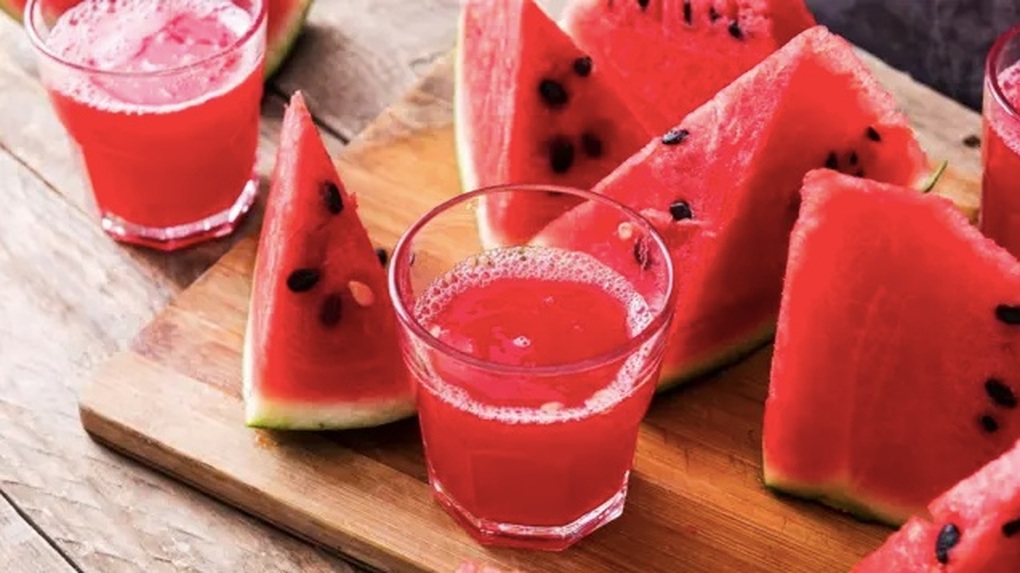Is watermelon a superfood?
Watermelon is considered a superfood, a term used to describe certain foods that are healthy and have many nutritional benefits while having minimal calories.
There are no hard and fast rules about which foods meet that criteria, but they are generally packed with vitamins, minerals, and antioxidants. That's certainly true of watermelon.
Watermelon is mostly water, so it can be a good choice for daily hydration. According to Healthline , watermelon is packed with nutrients, including potassium, magnesium, and vitamins A and C. Watermelon is also relatively low in calories.
It's also a rich source of citrulline, an amino acid that may improve exercise performance.

Watermelon is considered a superfood with many health benefits (Photo: Biget).
Additionally, this fruit contains antioxidants, including vitamin C, carotenoids, lycopene, and cucurbitacin E, all of which have health benefits. Lycopene and cucurbitacin E are thought to have anti-cancer potential.
Research shows that lycopene can help lower cholesterol and blood pressure, both of which are important for heart health. Watermelon also contains citrulline, an amino acid that can increase nitric oxide levels in the body and help blood vessels dilate to lower blood pressure.
Other vitamins and minerals in watermelon include magnesium, potassium, and vitamins A, B6, and C, which are all good for health, especially the heart.
This fruit also contains a natural pigment called beta-cryptoxanthin, which may protect your joints from inflammation. Research has even shown that over time, less inflammation can help protect you from conditions like osteoporosis or rheumatoid arthritis.
Can you eat watermelon at night?
Since watermelon is mostly water and can help hydrate your body, you can eat this fruit before going to bed.
Watermelon is a popular summer fruit, rich in water and contains many nutrients such as lycopene, citrulline, vitamins A and C.
Studies suggest that this sweet red fruit may even boost heart health, reduce muscle soreness and reduce inflammation, although more research is needed.
What should be noted when eating watermelon?
Is watermelon high in sugar?
Watermelon is generally safe for everyone, with some exceptions. Watermelon is a nutritious fruit, but eating too much can cause spikes in blood sugar, which can be bad for people who are managing diabetes or have insulin resistance.
Watermelon contains natural sugars, although less than other fruits. A medium-sized piece of watermelon (286g) has about 17.7g of sugar. It is a healthy fruit for people with diabetes and those watching their blood sugar, although portion size and the amount of watermelon you eat are important to keep in mind.
The American Diabetes Association recommends eating fresh, frozen, or canned fruit with no added sugar.
Do not eat bananas with watermelon
According to Nguyen Tri Phuong Hospital (HCMC), watermelon contains about 15% sugar and is rich in potassium. Meanwhile, bananas are also rich in potassium, about 300-500mg/100g. Therefore, patients with kidney failure should not eat two fruits with high potassium content such as bananas and watermelon at the same time.
If the potassium content in the blood increases, it can cause heart rhythm disturbances, seriously affecting the patient's health.
People with kidney failure should not eat a lot of watermelon.
Weak kidneys reduce the function of excreting water, so patients with kidney disease often have swollen feet.
Eating too much watermelon will cause water retention, the kidneys cannot excrete water from the body in time, leading to the amount of water exceeding the body's water storage capacity, increasing blood volume. The swelling becomes more and more serious, leading to fatigue and exhaustion.
Therefore, people with weak kidneys or kidney disease should eat less or not eat watermelon to ensure health.
Are you allergic to watermelon ?
A person can be allergic to watermelon if they are allergic to grass pollen, along with fruits such as peaches, celery, tomatoes, oranges, and other melons. This reaction is called oral allergy syndrome, which is a type of contact allergy in the throat and mouth that occurs when you eat these foods raw.
If you experience itching or swelling of the throat, mouth, face, lips, or tongue, seek immediate medical attention.
Source: https://dantri.com.vn/suc-khoe/dua-hau-rat-tot-nhung-co-4-dieu-ban-nhat-dinh-phai-biet-truoc-khi-an-20250729114647261.htm





























![[Photo] National Assembly Chairman attends the seminar "Building and operating an international financial center and recommendations for Vietnam"](https://vphoto.vietnam.vn/thumb/1200x675/vietnam/resource/IMAGE/2025/7/28/76393436936e457db31ec84433289f72)






































































Comment (0)